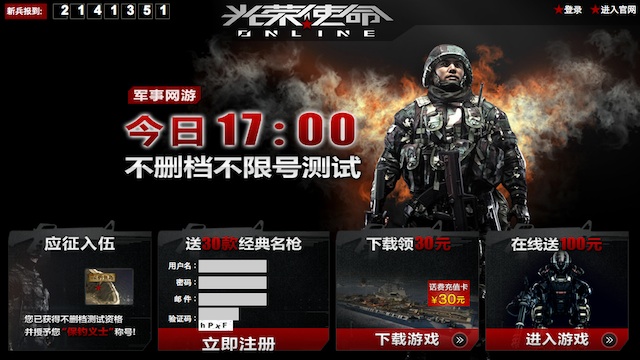SUMMARY
This is AI generated summarization, which may have errors. For context, always refer to the full article.

SHANGHAI, China – A video game backed by China’s military that lets players fight enemy forces in islands disputed between Beijing and Tokyo was set for release Thursday, August 1.
“Glorious Mission Online”, China’s answer to “Call of Duty”, marks the 86th anniversary of the founding of the People’s Liberation Army (PLA).
The game, an online version of an earlier first-person shooter used by the PLA to train troops, features the East China Sea islands known as Diaoyu by Beijing and Senkaku by Tokyo.
Tensions have been mounting over the islands, which are claimed by China but controlled by Japan. Beijing’s vessels regularly sail into the disputed waters and, according to state media, tell Japanese ships they are encroaching on its territory.
A press release for the game says: “Players… will fight alongside Chinese armed forces and use weapons to tell the Japanese that ‘Japan must return our stolen territory!'”
Images from the game’s website are labelled “Guard the Diaoyu islands”, and a trailer posted online features shots of Japan’s Prime Minister Shinzo Abe.
It also shows planes taking off from a computer-generated version of China’s first aircraft carrier, the Liaoning, which went into service last year.
The game was only due to become available at 5:00pm (0900 GMT), but its designers Giant Interactive Group, who developed it jointly with the PLA, told AFP millions of users had already registered to play.
Giant co-operated closely with the PLA while working on the game to ensure that weapons looked authentic and soldiers’ voices were accurate, said company vice-president Gu Wen.
“Our relationship with the military is like the relationship between the US army and Hollywood,” he said.
The release comes at a time of increased fears over the PLA’s expansion amongst China’s neighbors — Beijing is also in dispute with several countries in the South China Sea.
But Gu linked the game with attempts by the PLA to present itself as more transparent, including inviting foreign media to tour military bases, to boost its image abroad.
“It’s about soft power,” he said. “Through the game we want to allow ordinary people to gain an understanding of the army, which is often seen as closed-off and mysterious.
“In Western games the People’s Liberation Army is always the enemy, this is the first game where it is on the good side.”
China’s neighbors have sought closer ties with the US in the face of growing concerns about Beijing’s mounting military budget, which now ranks second in the world, according to the Stockholm International Peace Research Institute.
But experts say that its military technology lags far behind that those of the US and Europe — which embargo arms exports to China.
“In a lot of respects the Chinese army is behind other countries, trying to catch up,” Gu said.
“The US army is shown every day with guns in Iraq, and no one thinks that’s strange, but the Chinese army is shown playing computer games and people think that’s weird.”
It will also boost military recruitment, he added.
“On one hand it’s a training tool, on the other hand it’s about army recruitment,” Gu said. “The army aims at recruiting university graduates, and gaming is the most popular culture among students.”
China’s government banned home video game consoles, described by state media as “electronic heroin”, in 2000 after fears that they were a negative influence on China’s youth.
But the past decade has seen an explosion in computer games played online, with China’s internet game market raking in 31.3 billion yuan ($5.1 billion) in the first half of this year alone, according to industry estimates.
Maggie Du, director of Giant’s Center for Overseas Business Development, insisted “Glorious Mission Online” would not add to the tensions between China and its neighbors.
“We need to be related to actual events, but it’s not about politics, it’s a commercial consideration to attract customers.”
The company hopes to attract foreign gamers to fight alongside the PLA, she added, and possible future versions of the game designed for export might look to avoid identifying participant nations.
“We might replace the US and Russian armies with robots or zombies or something like that,” she said. – Rappler.com
Add a comment
How does this make you feel?
There are no comments yet. Add your comment to start the conversation.